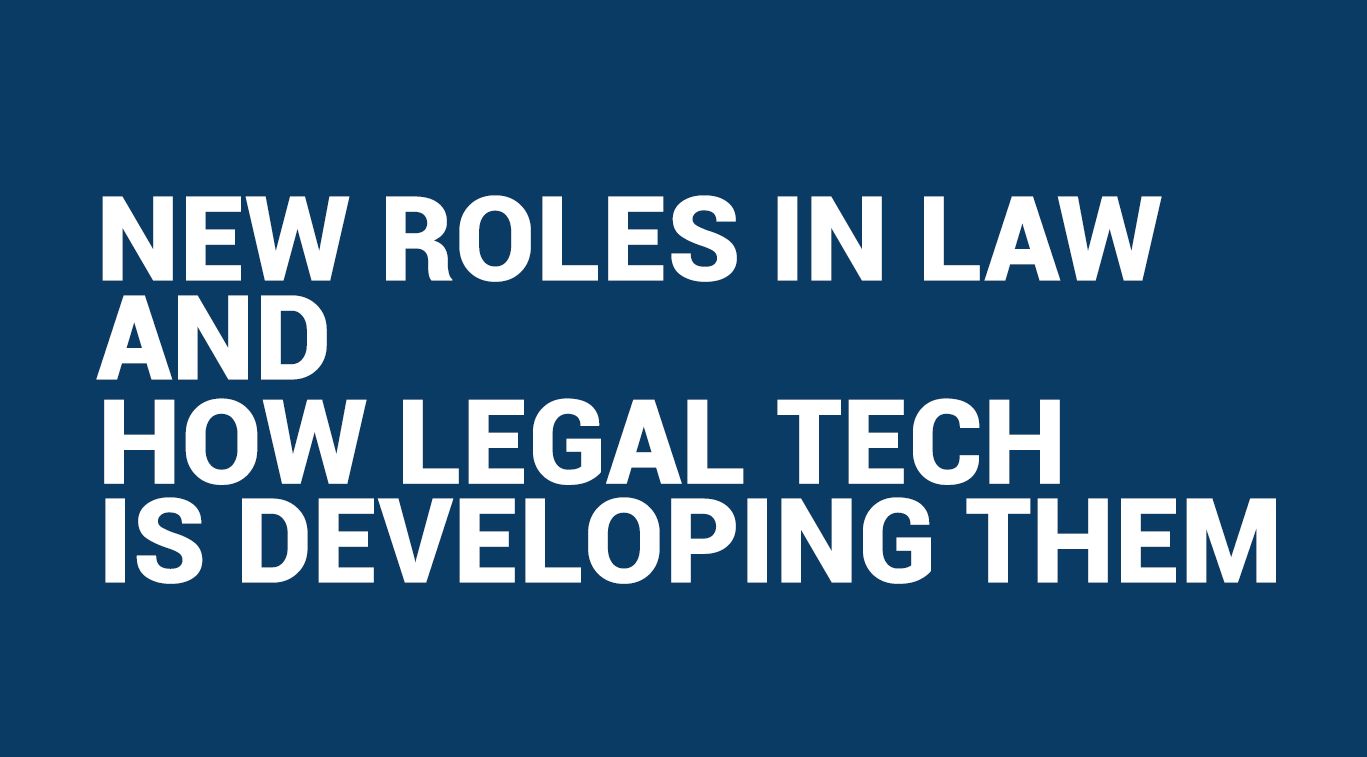New Roles in Law and How Legal Tech Is Developing Them

Written by Fatima Freifer
Blogger

Technology’s Role in the Legal Sector
Law firm online footprints are rapidly growing, and technology in the legal sector is introducing new methods that are more affordable, accessible, and of higher quality. Web-based resources are exacerbating the disintermediation culture by allowing clients to bypass solicitors and meet their needs through increasingly sophisticated systems. [1] As a result, legal technology trends have surpassed and will continue to exceed certain capabilities of traditional solicitors. This means that legal professionals must adapt in order to provide clients with a broader range of expertise.
Any discussion about the future of the legal profession must take into account the role that technology will play in shaping and improving that future. Similarly, any discussion of technology must acknowledge and consider the legal framework within which it operates. The use of new technologies in law firms mirrors what is happening in the broader business economy, where the emergence of new technologies, processes, and automation has resulted in exciting change and vast consumer and business benefit, but also a new modern work structure which embraces legal technology artificial intelligence and the future of law practice as a result. [2]
Improved Resource Management
Previously, junior attorneys were hired to do odd jobs such as gathering, storing, managing, and processing titles or informing lawyers about their daily schedule. This not only makes them disinterested in the process, but it also makes senior attorneys wonder how they can better utilise their potential, which is something that legal technology solutions can assist with. [3]
People who use the court system submit evidence and arguments to the judge online or through some other form of electronic communication. Judgments are essentially transferred from the courtroom to the internet. Theoretically, by establishing extended courts in a digital society, it is possible to venture beyond decisions made by judges to form some kind of diagnostic system to guide clients regarding their legal options, how to gather evidence, and provide alternative ways for dispute resolution. [4]
The legal field, like many other industries during the onset of the pandemic, has seen unprecedented effects on employment rates, with new law school graduates and support staff such as people working in legal software trainer jobs being disproportionately affected. While this historic period is not without its challenges, the rush toward technology has created unique job opportunities for lawyers and firms eager to embrace the legal industry’s future. [5]
The legal system has a long history of tradition, procedure, and structure. The tech industry stands out as a market that is constantly changing and revising. While the fundamental principles of the legal profession should be embraced and preserved, legal technology will revolutionise many firms’ day-to-day operations. It is up to lawyers to process these new tools in order to stay afloat in an ever-expanding digital world. [6]
How Lawyers are Adapting to the Changing Landscape of Law
The impact of technology on legal services cannot be overstated, especially in light of the current global pandemic. Artificial intelligence and other technological advancements enable modern software to scan legal documents, streamline communications, and locate relevant casework for lawyers. [7]
While supporters argue that the online freelance economy fosters unlimited innovation and empowers both workers and entrepreneurs, detractors claim that it disenfranchises the workforce and undermines workers’ rights. New technologies offer exciting possibilities, but they also introduce uncertainty.[8] Companies can efficiently automate processes, connect needs with solutions more quickly, and have a larger pool of employees on standby, and are on the verge of potentially massive upheaval. Individual rights may be jeopardised if they are not carefully considered. [9]
There are still so many law firms still drowning in paper and relying on antiquated systems. The reason for this could be found in the fundamentals of how legal practices operate. Legal work necessitates caution and restraint, client confidentiality, and reliance on precedent. It is not surprising then, that law firms have been slow to adopt new legal technology software, even when doing so would clearly benefit both staff and clients.
Firms that had already begun their digital transformation via legal technology solutions fared better than those that had not when COVID-19 sent millions of office workers home. However, the pandemic aided in hastening the transition for those who were hesitant to adopt new tools. [10]
Adoption of technology in the legal sector and agencies can help to improve efficiency while also attracting more clients. It enables more flexible legal services, increases transparency, and reduces the likelihood of documentation errors. Legal technology is also creating new jobs that did not previously exist. Indeed, legal technology firms are hiring more people than law firms.
Conclusion
For many years, lawyers have relied on technological tools ranging from case management software and law firm document management technology to online legal research. However, over the last few years, the industry has seen exponential investment in technology, with more firms looking for ways to reduce supportive staffing costs while increasing their ability to focus on more nuanced legal work.
Legal technology is radically altering the practice of law. It has completely transformed the way lawyers work, from how they research and prepare cases to how they interact with clients, and it will continue to do so in new and unpredictable ways. Legal technology has given rise to new opportunities in the legal profession including legal software jobs. It has also increased efficiency, productivity, and access to justice. Because of the emergence of new technologies, the legal profession is undergoing a significant transformation. Legal technology is creating new jobs and redefining how work is completed.
References
[1] The role of technology in the future of legal professions, 27 Feb 2017, Rachel Buchanan, https://www.law.ox.ac.uk/research-and-subject-groups/research-collection-law-and-technology/blog/2017/02/role-technology
[2] UK-Singapore digital deal includes a world first on lawtech, 25 Feb 2022, https://www.lawsociety.org.uk/contact-or-visit-us/press-office/press-releases/uk-singapore-digital-deal-includes-a-world-first-on-lawtech
[3] What’s the Role of Technology in the Legal Sector? Peeyush Singh, August 6, 2021, https://appinventiv.com/blog/technology-in-legal-sector/
[4] The Future of Lawyers: Legal Tech, AI, Big Data And Online Courts, Bernard Marr, Jan 17, 2020, https://www.forbes.com/sites/bernardmarr/2020/01/17/the-future-of-lawyers-legal-tech-ai-big-data-and-online-courts/
[5] Technology in law is the new norm, August 3, 2021 https://legal.thomsonreuters.com/blog/technology-in-law-is-the-new-norm/
[6] The future of the legal profession depends on digital transformation, January 13, 2022 https://www.hpe.com/us/en/insights/articles/the-future-of-the-legal-profession-depends-on-digital-transforma-2201.html
[7] How Tech Is Supporting the Future of Legal Work, RACHEL VANNI, February 24, 2021, https://kirasystems.com/learn/how-tech-is-supporting-the-future-of-legal-work/
[8] Virtual Legal Consultations & Ethical Considerations, Fatima Freifer https://goodlawsoftware.co.uk/virtual-legal-consultations-ethical-considerations
[9] Imposter syndrome and the legal sector, Matthew Dow, 11/09/2019 https://www.lawcareers.net/Explore/BlogPost/Matthew-Dow/Imposter-Syndrome-and-the-Legal-Sector
[10] Managing Work Stress in the Holidays, Fatima Freifer https://goodlawsoftware.co.uk/managing-work-stress-in-the-holidays








